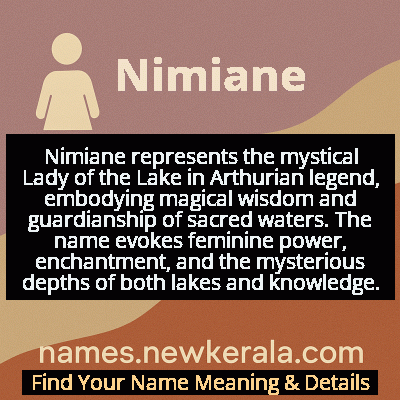Nimiane Name Meaning & Details
Origin, Popularity, Numerology Analysis & Name Meaning of Nimiane
Discover the origin, meaning, and cultural significance of the name NIMIANE. Delve into its historical roots and explore the lasting impact it has had on communities and traditions.
Name
Nimiane
Gender
Female
Origin
Arthurian
Lucky Number
2
Meaning of the Name - Nimiane
Nimiane represents the mystical Lady of the Lake in Arthurian legend, embodying magical wisdom and guardianship of sacred waters. The name evokes feminine power, enchantment, and the mysterious depths of both lakes and knowledge.
Nimiane - Complete Numerology Analysis
Your Numerology Number
Based on Pythagorean Numerology System
Ruling Planet
Moon
Positive Nature
Diplomatic, friendly, artistic, empathetic.
Negative Traits
Over-sensitive, moody, indecisive, prone to self-pity.
Lucky Colours
Green, cream, white.
Lucky Days
Monday.
Lucky Stones
Pearl, moonstone.
Harmony Numbers
1, 3, 4.
Best Suited Professions
Diplomats, mediators, caregivers, artists.
What People Like About You
Cooperative spirit, friendliness, artistic talent.
Famous People Named Nimiane
Nimiane
Arthurian Enchantress
Guardian of the Lady of the Lake title and mentor to powerful knights
Nimiane
Literary Character
Featured in French prose cycles as a powerful fay with prophetic abilities
Nimiane
Mythological Figure
Keeper of Excalibur and other magical artifacts in lake sanctuaries
Name Variations & International Equivalents
Click on blue names to explore their detailed meanings. Gray names with will be available soon.
Cultural & Historical Significance
Throughout literary history, Nimiane's character has evolved to represent different aspects of feminine power - from dangerous seductress to wise guardian. Her association with lakes connects her to pre-Christian water cults and goddess worship, while her role in Arthurian courtly tradition reflects medieval attitudes toward female authority and supernatural influence. The enduring fascination with her character speaks to the timeless appeal of mysterious, powerful women who operate outside conventional social structures, making her a foundational figure in the development of the enchantress archetype in Western literature.
Extended Personality Analysis
Nimiane is typically characterized by profound wisdom, strategic intelligence, and mysterious reserve. As an enchantress of considerable power, she demonstrates patience and long-term planning, evidenced by her careful manipulation of Merlin to acquire his knowledge before confining him. Her nurturing side emerges in her guardianship of Lancelot, showing she can be protective and maternal toward those she favors. However, this is balanced by a certain emotional detachment and pragmatic approach to relationships, viewing them through the lens of larger destinies and magical purposes.
Her connection to water symbolism suggests depth of emotion and intuition, yet she maintains an enigmatic quality that keeps others at a distance, embodying the archetype of the wise but inaccessible feminine power. Nimiane exhibits remarkable self-control and the ability to work within complex systems of magic and prophecy. She is neither purely benevolent nor malicious, but operates according to her own understanding of balance and destiny. This moral complexity makes her one of the most psychologically intriguing figures in Arthurian legend, representing the idea that true power requires both compassion and the willingness to make difficult decisions for greater purposes.
Modern Usage & Popularity
In contemporary times, Nimiane remains primarily a literary and mythological name rather than a common given name. Its usage is almost exclusively confined to Arthurian enthusiasts, fantasy literature fans, and parents seeking unique mythological names with strong feminine associations. The name appears occasionally in fantasy genre works, particularly those reimagining Arthurian legends, and maintains a niche presence in pagan and magical communities who appreciate its connection to water deities and enchantress archetypes. Its rarity ensures it carries distinctive character while its Arthurian pedigree provides cultural depth and recognition among mythology aficionados. The name has never ranked in official baby name statistics, preserving its exclusive and specialized appeal for those deliberately choosing names with specific mythological resonance.
Symbolic & Spiritual Meanings
Nimiane symbolizes the transformative power of water, representing both the surface calm and hidden depths of consciousness and emotion. As a lake-dwelling figure, she embodies the boundary between worlds - the tangible and spiritual, mortal and magical. Her association with giving and receiving Excalibur positions her as a mediator of power and destiny, while her entrapment of Merlin represents the containment and control of knowledge. The lake itself becomes symbolic of the subconscious, intuition, and the mysterious feminine principle that both nurtures and demands sacrifice. Her character serves as a metaphor for the wisdom that comes from embracing both light and shadow aspects of power, and the understanding that true authority often requires operating from places of mystery and indirect influence rather than overt dominance.

